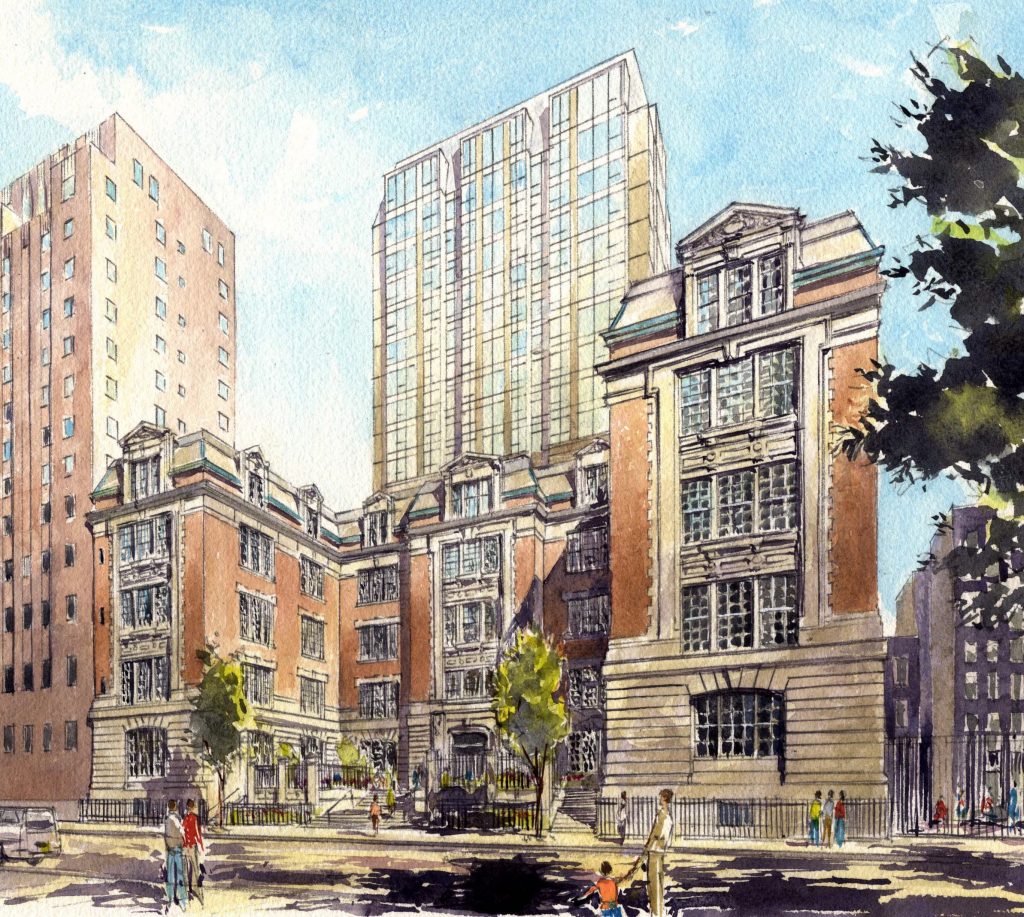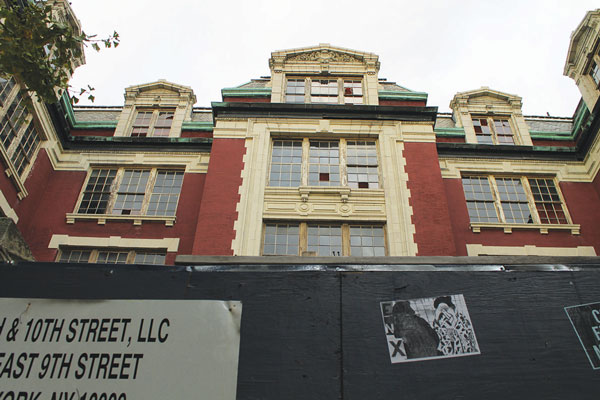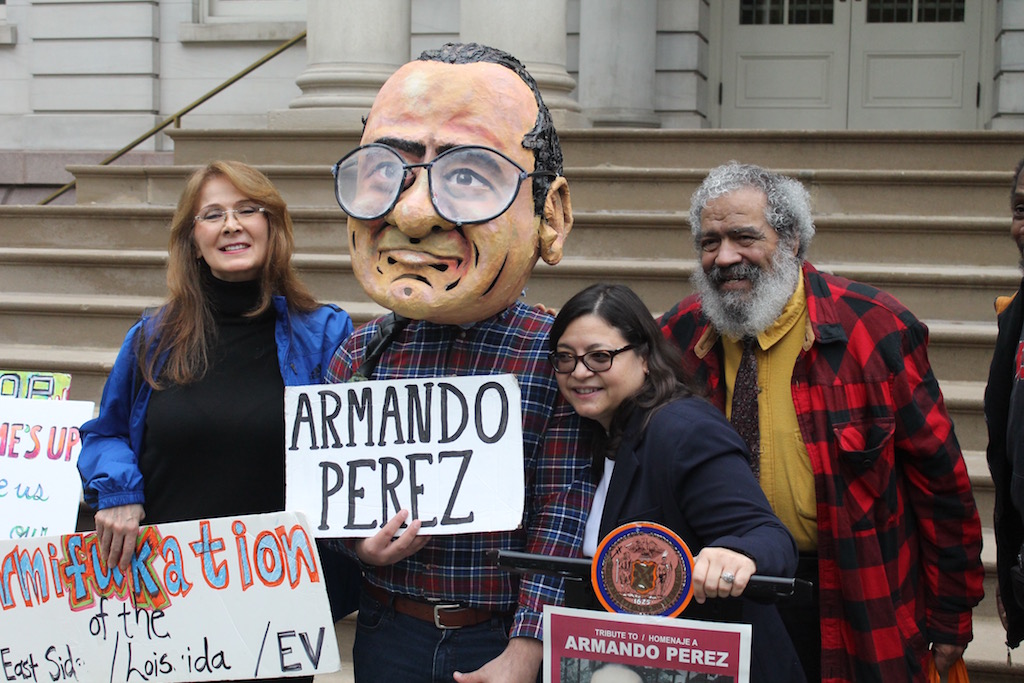BY LINCOLN ANDERSON | The embattled owner of the old P.S. 64 fears he will soon lose the property to foreclosure if the city doesn’t grant him a permit to renovate the place into a dorm, according to a lawsuit he filed against the city in September.
The lawsuit, filed in State Supreme Court by Gregg Singer, charges Mayor Bill de Blasio and the Department of Buildings with frustrating his efforts to fix up the historic building, calling it an ongoing campaign against him by City Hall stretching back to de Blasio’s predecessor, Mike Bloomberg.
Singer accuses the city of an “uneven hand” and “evil eye,” plus “arbitrary and capricious” actions, in thwarting his efforts to capitalize on the building. City Hall “keeps moving the finish line,” the suit charges, in hopes that the developer’s plan finally “collapses.”
On Nov. 26, the city’s Corporation Counsel, or Law Department, responded with a motion to dismiss Singer’s suit, refuting all its arguments. The parties are next due back in court on Dec. 18.
Long-running saga
Singer bought the decommissioned 1905 school building at 605 E. Ninth St. — which stretches through to E. 10th St. just east of Avenue B — at a city auction in 1998. Three years later, he evicted the building’s longtime tenant, CHARAS/El Bohio, a Puerto-Rican led cultural and community center.
Since then, Singer’s efforts to redevelop the property have repeatedly been stymied by opposition from community activists and the local councilmember and actions by City Hall and city agencies. The vacant structure is a neighborhood eyesore. The lawsuit blasts the city for selling the old school to Singer, only to bow to “political pressure” and frustrate his efforts to redevelop it.
The suit also notes that current Councilmember Carlina Rivera, who represents the East Village, has said that the city should use “any means necessary” to get the property back.
Although he bought the building for the bargain-basement price of $3.2 million, Singer’s suit says the property has drained him of $70 million over the more than 20 years since then.

In 2004, Singer filed for building permits to raze most of the existing “H”-style school building and construct a 19-story dormitory tower. (A previous plan had called for demolishing the entire school and erecting an even taller tower.) But, in 2006, in a surprising move under Mayor Bloomberg, the city’s Landmarks Preservation Commission designated the property an individual landmark, quashing Singer’s plan.
Singer eventually conceded that he could only renovate the existing property as a dorm and focused on doing that.
Tenants cancel leases
In 2013, The Cooper Union signed a 15-year lease for the building’s second and third floors while the Joffrey Ballet signed a 10-year lease for the ground floor and first floor.
Singer’s suit contends that then-Councilmember Rosie Mendez met with then-President Jamshed Bharucha of The Cooper Union, warning him, “I’m not happy with this dorm plan. The community is not happy. [T]here will be protests and I will be joining them when that happens.”
Ultimately, both The Cooper Union and Joffrey Ballet canceled their leases.
Subsequently, in 2016, Singer entered into a lease with Adelphi University for the building’s second and third floors, but the de Blasio administration “slow walked” the approval process for eight months, the suit claims. Ultimately, D.O.B. rejected the lease application, telling Adelphi it could appeal through the Board of Standards and Appeals, which would take another seven months.
The suit dubs this a “hostage lease crisis” that led to Adelphi revoking its lease in October 2017.
A stop-work order on the building has been in effect since 2015, and a full-vacate order since this past February after cracks were reported on the building’s E. 10th St. facade.
Mayor’s statements
Specifically, Singer’s suit blasts Mayor de Blasio for saying, two years ago at a Lower East Side town hall, that the city was “interested in reacquiring” the old P.S. 64, and that it was a mistake, made under Mayor Rudy Giuliani’s tenure, to sell the property to Singer.
“To place [the old P.S. 64] in the hands of a private owner was a failed mistake,” de Blasio said then. “We are ready to right the wrongs of the past and will work with Councilmember Mendez and her successor to get that done.”

The developer’s suit also prominently cites de Blasio’s response to questions from this reporter a year ago at a media roundtable at Brooklyn Borough Hall. Asked then about the status of the city’s efforts to reacquire the vacant East Village building, de Blasio answered that Singer had been “exceedingly uncooperative.”
“We’ve tried to have a productive conversation about purchase,” the mayor told this reporter. “We’ve gotten nowhere so far. We’re not giving up. We’re working very closely with the councilmember, Carlina Rivera [Mendez’s successor]. I’m very frustrated with that owner.”
The lawsuit, however, counters that Singer has been unable to reach the mayor to discuss a possible purchase and that he has had no conversations with the de Blasio administration about it.
“Not only did the Mayor never once reach out to the petitioner in between his October 2017 statement [at the town hall] and August 2018 statement [at the media roundtable],” the suit says, “but to this day, plaintiff has never received a single offer, email or call from the Mayor or anyone in his office ever.”
Owner’s foreclosure fear
Meanwhile, Singer, in his lawsuit, charges that the mayor’s statements — at both the town hall and the media roundtable — “were the final death blow to Petitioner, as the property’s lender is trying to foreclose on the property because it now feared that Petitioner would lose the building as a result of the City’s unlawful actions.”
At another point, the lawsuit states, “Apparently, the City is trying to delay long enough for the lender to finalize its foreclosure against Petitioner… .
“Not only has Petitioner been forced to expend over $73 million — $70 million over the purchase price — but his property is currently being foreclosed on,” the suit states. “There is no question that Petitioner is currently unable to produce the approximately $50 million necessary to stop the foreclosure.”

If D.O.B. were to give Singer a permit, on the other hand, the suit maintains, “This will immediately reaffirm the value of the property, enable Petitioner to solicit additional investors and lenders to thwart foreclosure and/or convince the debtee-bank that foreclosure is unnecessary, and to find a tenant or tenants to provide the building with a consistent stream of revenue to pay the building’s debt and operating expenses once renovated.
“In fact,” the suit continues, “Madison Realty Capital provided Petitioner with a Term Sheet affirming that if he obtained a construction permit it would lend him the money to pay off the current bridge loan by providing a construction loan.”
Singles out Sosnick
The developer alleges that a representative of Aaron Sosnick — a wealthy hedge funder and member of the East Village Community Coalition who lives next to the old P.S. 64 — did reach out to him about buying the property. This past July, Sosnick reportedly purchased the Boys’ Club of New York’s Harriman Clubhouse, at E. 10th St. and Avenue A, for $32 million to save it from being sold to a developer.
“To date, the City has never once emailed, called or spoken to Petitioner about purchase [of] the building,” the suit states. “Unless the Mayor sees no distinction between a call by Mr. Paul Wolf, a private agent, made on behalf of a mysterious buyer who turns out to be a Mr. Sosnick-controlled mega entity and ‘the City,’ the Mayor’s statement must be labeled — to put it kindly — a fabrication.”
Wolf is a real estate broker who brokered the Boys’ Club building sale. He is also a trustee of Sosnick’s La Vida Feliz Foundation. Crain’s reported Singer as claiming that Wolf, “for the past 12 years” has been trying to get him to sell the old P.S. 64.

Singer’s suit states that Wolf e-mailed Carl Weisbrod, the City Planning commissioner, in January 2017, seeking to purchase the old P.S. 64.
Singer additionally says that when the Boys’ Club building was for sale, he offered to buy it and lease it to the city as a community center for a minimum of 30 years. But he says the city rebuffed the idea.
Dorm Rule disagreement
At the heart of Singer’s litigation is the charge that the city has been misapplying Rule 51, the so-called “Dorm Rule,” to block his efforts to redevelop the iconic Alphabet City property. The site carries a deed restriction for “community facility use.”
In short, the suit contends, the Dorm Rule was created, in 2005, to stop developers from exploiting a “bait and switch” under which new dorms — which, under community facility-use zoning, could be built taller than residential buildings — were being converted to residential use. The suit argues that, after the East Village and Lower East Side rezoning of 2008, that threat was removed since developers could no longer use surrounding “air rights” to build extra-tall dorms that could then be converted to residential use.
Rule 51 also requires a dorm developer to show, beforehand, that there will be an “institutional nexus” at the property, meaning legitimate school tenants and uses. But Singer’s suit contends that, since Rule 51 should not be applied in this case — since he can no longer build an extra-tall building — all he needs to do is vouch that the tenants would meet the requirements.
‘Barrage of violations’
Meanwhile, the city keeps hitting the building with violations, the lawsuit notes, such as when a 311 call was made about cracks on its facade on Feb. 13, 2019, causing the old school and E. 10th St. to be evacuated.
Singer claims he can’t make any emergency repairs, though, because the city continues to refuse to give him a permit.
The developer is asking for a so-called Writ of Mandamus, a court order to compel D.O.B. to issue the building permit.
Corp. Counsel response
In its Nov. 26 response to Singer’s suit, the Corporation Counsel wrote, “For nearly two decades, petitioners have continuously pursued flawed plans to develop the subject premises as a generic student residence and not as a legal ‘dormitory’ that would qualify as a ‘community facility’ use under the Zoning Resolution. Rather than demonstrate that they have leased the property (or significant portions of the property) outright to a single college or university, petitioners have submitted deficient leases to DOB that merely provided schools with the option of renting most of the beds in the building.”
The Corp. Counsel’s response says that all of the leases — such as for The Cooper Union for 196 beds or Joffrey Ballet for 132 beds — were “illusory leases to satisfy the institutional nexus.” This was, the response argues, because Singer planned to merely “rent beds” to the schools. Meanwhile the Adelphi lease only required the school to rent a mere 20 beds, with an option to use 196 beds.
The Corp. Counsel’s response says the appropriate thing for Singer to do was to take his grievance to the Board of Standards and Appeals, and that the B.S.A. would decide on “the interplay between the Zoning Resolution and the Dorm Rule.
‘Politically active community’
“It is undisputed that petitioners’ proposed development is located in a politically active community that opposes the construction of a dorm,” the city’s response continues. “Although petitioners purport to claim that DOB improperly succumbed to political pressure, and that the Mayor, former City Council Member Mendez and City Council Member Rivera’s conduct in opposing the dormitory in accordance with their constituents’ desires was unlawful, petitioners are simply incorrect. There is nothing improper about politicians exercising their own First Amendment rights and advocating on behalf of their constituencies.”

The Corp. Counsel also said it’s not true that Singer cannot make emergency facade repairs without a building permit for interior renovations. In fact, it’s a “legal obligation” for him to do so, the response says.
The city’s response notes that Singer’s own engineer, in a March 2019 report, stated that loose terra-cotta trim on the old school’s parapets and a chimney are hazardous and need to be fixed.
Another lawsuit coming
Nicole Epstein, a spokesperson for Singer, told The Village Sun that the mayor — in terms of reacquiring the building for the city — still “hasn’t offered anything despite repeated requests.”
In October, a federal judge dismissed a similar lawsuit by Singer, but Epstein said the developer is appealing. Part of that appeal, she said, is that the city allegedly stonewalled Singer’s efforts to obtain e-mails and other communications, under the Freedom of Information Law, between Sosnick and former City Planning Chairperson Weisbrod about the old P.S. 64.
“We will be victorious on that, as well as a soon-to-be-filed lawsuit,” she said.

Be First to Comment